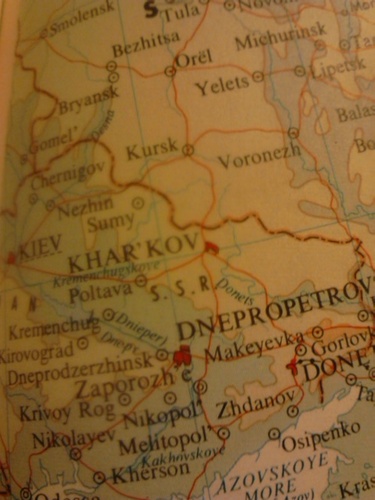
The Russian invasion of the Ukraine is yet another terrifying chapter in Putin's attempts to destroy his neighbors. So what should NATO do?
Russia's invasion of the Ukraine is following a time-honored pattern of Putin's foreign policy: foment dissent with separatists, destabilize your neighbor's regimes, and invade to conquer part of that country. Then repeat the plan until the whole country is yours. We've seen it happen in Moldova and the Republic of Georgia. It's happened in the Crimea, and East Ukraine is next.
Below is a map of the East Ukraine, when it was part of the Soviet Union.
In each case, it appeared that the neighbor was gaining the upper hand against the separatists. Georgia launched an offensive to get their territory back, and the Ukrainian government was actually defeating the rebels. Then Russia used "rebel rescue" as an excuse to invade another country.
Little has been done about Moldova. Bush offered little more than occasional "tough talk" on Georgia. Obama didn't even follow in Jimmy Carter's footsteps with an Olympic boycott (last done over Russia's Invasion of Afghanistan, which also followed the pattern of protecting a border client).
Russia's conquest of the Crimea at least resulted in economic sanctions. But while those are hurting the Russian economy, they aren't hurting Putin himself, or his purported popularity.
NATO, the North Atlantic Treaty Organization, made up of West Europe and North America, is holding an emergency summit as of the writing of this article. What should this organization do?
While their combined power should be enough to defeat Russia, that's not an event we're likely to see. Don't expect a reprisal of Tom Clancy's Red Storm Rising anytime soon for several reasons.
First, as Putin has reminded the West, Russia is a nuclear power, even if they have fewer missiles and warheads than in the past. And while any Putin nuclear action would be checked by the West, the cataclysmic outcome would be too much to bear.
Second, NATO requires unanimity in action. While that's a bonus for members, it's often hard for that number of countries to agree on a risky policy of open fighting in the Ukraine.
Yet standing by and watching the Ukraine get gobbled up isn't a workable plan. In addition to standing by and witnessing the slaughter of the pro-West regime and Ukrainians who impeached their corrupt leader, it would invite Putin to bite off more of his neighbors' land, rewarding aggression... again.
So NATO must act. The best solution may be to send NATO troops to Western Ukraine. This should free up the Ukraine government troops to deal with "rebels." And if the Ukrainians are better armed to do it with extra NATO gear, it would be so much the better. Russia would need a full-scale invasion of the country, something that would mess with its public relations campaign worse than the rebel downing of a Malaysian jet.
John A. Tures is a professor of political science at LaGrange College in LaGrange, Ga. He can be reached at jtures@lagrange.edu.

